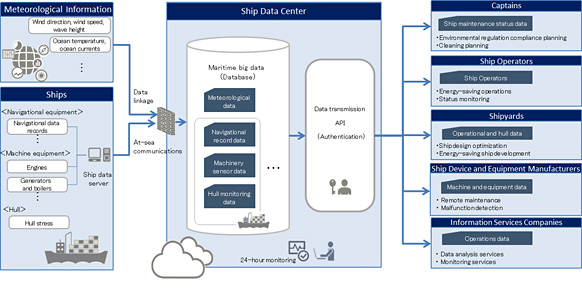Archived content
NOTE: this is an archived page and the content is likely to be out of date.
Fujitsu to Build Industry-First Maritime Big Data Platform for Nippon Kaiji Kyokai
A shared maritime platform for use by maritime businesses, which aggregates ship and marine weather data
Fujitsu Limited
-
[1] VDR
Voyage Data Recorder. A device required for ships travelling through international waters, which records navigational information such as the ship's position, speed and heading.
-
[2] Regulations proposed as new international standards
ISO/PWI19847 is a new international standard regulation which defines the requirements for a data server on a ship for the purpose of sharing voyage, machinery and other maritime data in temporal sequence. ISO/PWI19848 is a data standard for ship machinery and equipment, proposed as a new international standard regulation in parallel with ISO/PWI19847, to standardize all types of data exchanged between ship-mounted devices or systems, and improve the connection-accessibility between devices and systems.
About Fujitsu
Fujitsu is the leading Japanese information and communication technology (ICT) company, offering a full range of technology products, solutions, and services. Approximately 156,000 Fujitsu people support customers in more than 100 countries. We use our experience and the power of ICT to shape the future of society with our customers. Fujitsu Limited (TSE: 6702) reported consolidated revenues of 4.7 trillion yen (US$41 billion) for the fiscal year ended March 31, 2016. For more information, please see http://www.fujitsu.com.
All company or product names mentioned herein are trademarks or registered trademarks of their respective owners. Information provided in this press release is accurate at time of publication and is subject to change without advance notice.
Date: 06 May, 2016
City: Tokyo
Company:
Fujitsu Limited
